| | | | | | | Presented By Amazon | | | | Axios Sneak Peek | | By the Axios Politics team ·Nov 14, 2021 | | Welcome back to Sneak. Infrastructure becomes law tomorrow. President Biden and China's Xi Jinping hold a virtual summit. And Congress is back. ⚡ Situational awareness: "President Biden intends to name former New Orleans Mayor Mitch Landrieu to supervise the roughly $1 trillion infrastructure bill, turning to a veteran of Hurricane Katrina's recovery to coordinate the rebuilding of roads, bridges and ports," WSJ reports, citing people familiar with the plans. Smart Brevity™ count: 1,410 words ... 5.5 minutes. Edited by Margaret Talev. | | | | | | 1 big thing: NATO chief: Jan. 6 was an attack on allies' "core values" | 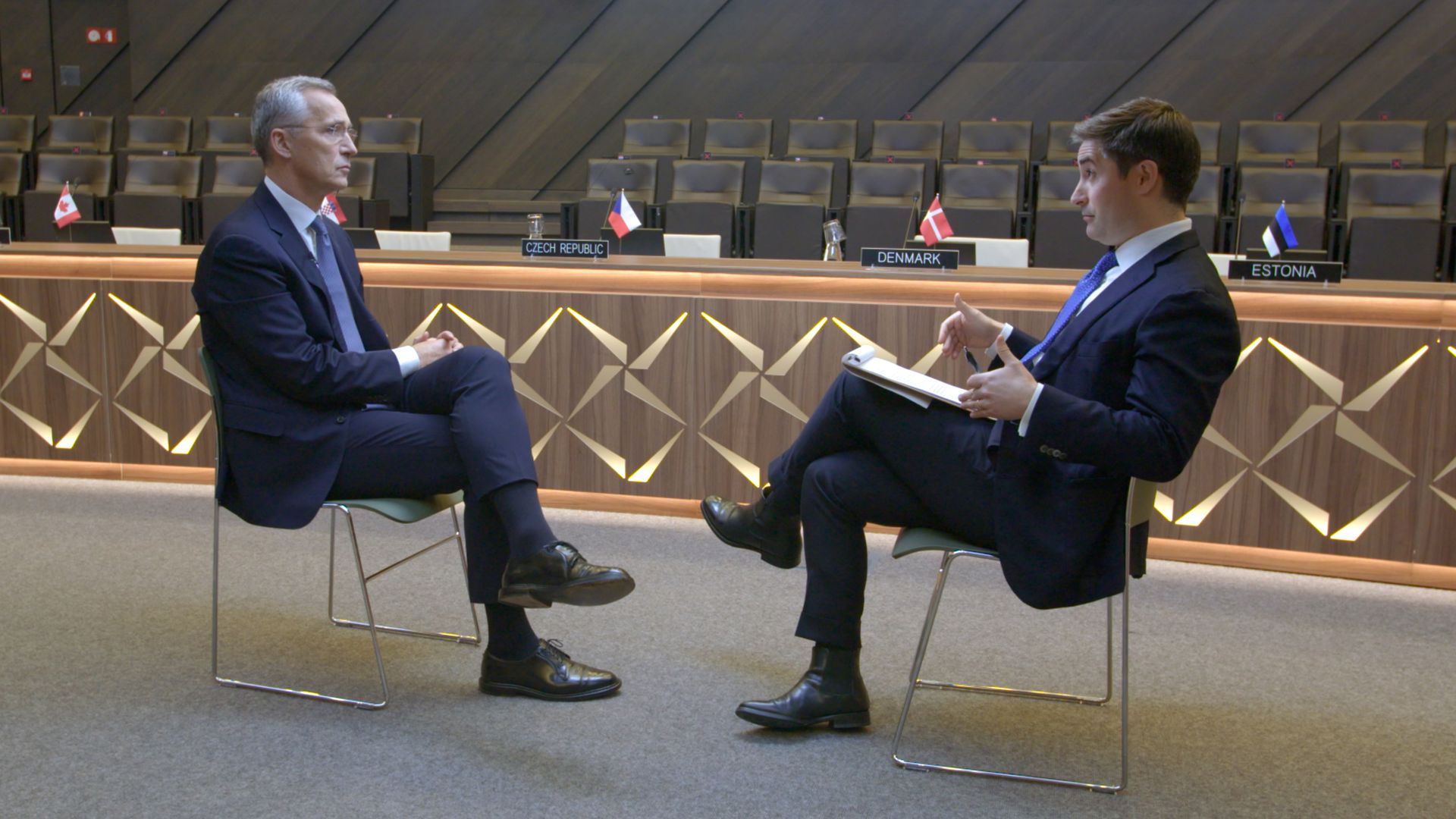 | | | Photo: "Axios on HBO" | | | | NATO Secretary General Jens Stoltenberg told "Axios on HBO" that the Jan. 6 siege on the U.S. Capitol was also an attack on the core values of the world's biggest military alliance. Driving the news: "I regard that as an attack on the core democratic institutions of the United States and therefore also on core values of NATO," Stoltenberg told Axios' Jonathan Swan in an interview taped last Monday at NATO's headquarters in Brussels. - Stoltenberg also touched on Russia, Turkey, Afghanistan and China — but notably, wouldn't say what NATO would do if China were to invade Taiwan.
The big picture: Despite how unnerved he was watching the events of Jan. 6, Stoltenberg said he continues to believe in America's future as a liberal democracy. - "I'm confident that our biggest ally ... will remain a strong democracy," he said.
- The U.S. "has been through difficult times, crises, before and always come out on the other end with a strong commitment to democratic institutions."
The bottom line: Stoltenberg — who became secretary general in 2014 and finishes next year — has led the alliance through arguably the rockiest stretch in its history. - He first had to contend with former President Trump threatening to withdraw the U.S. from NATO — a move that would have ended a military alliance that has held the peace in Europe since 1949.
- This year — with President Biden's debacle of a withdrawal from Afghanistan — Stoltenberg is accepting the unhappy reality that NATO's 20-year mission there ended in failure.
- The U.S.-NATO mission has left behind a catastrophe in Afghanistan: Total Taliban rule, mass starvation, girls shut out of schools. And Afghanistan is now re-emerging as a terrorist haven. Military leaders say al-Qaeda and ISIS could re-emerge as a threat to the U.S. homeland in as little as six months.
Watch a clip. |     | | | | | | 2. More highlights from Stoltenberg's "Axios on HBO" interview |  | | | Protesters stage a rally to "Stop the creeping occupation!" on Nov. 4 outside the office of Ukrainian President Volodymyr Zelensky in Kiev. Photo: Sergei Supinsky/AFP via Getty Images | | | | On Russia-Ukraine: Stoltenberg told Jonathan he's closely monitoring the "unusual" Russian troop movements near Ukraine's border. However, he defended the alliance's unwillingness to grant Ukraine the type of membership that would offer meaningful protection against Russian President Vladimir Putin. - He pointed out that membership can only be achieved if all 30 member nations support it. However, Stoltenberg acknowledged the disappointment Ukrainians feel about NATO's promise of membership in 2008 that, 13 years later, remains unfulfilled.
China: Stoltenberg has made much, recently, of expanding NATO's mission to include the "systemic challenge" of China. - But he would not answer whether NATO would play any role if China invaded Taiwan — a non-NATO member, but a country whose fate is directly tied to the credibility of U.S. and Western deterrence against China's ambitions.
- "If I started to answer all your hypothetical questions, I will only add to the tensions we see in that region," he argued.
Afghanistan: Pressed on the U.S.-NATO failure to anticipate the speed of the Afghan security forces' collapse to the Taliban, Stoltenberg said, "There are some serious lessons to be learned. - "I have launched a 'lessons learned' process at NATO."
Turkey: Stoltenberg hesitated for a moment when asked if he still considered NATO member state Turkey to be a democratic government. - "They have elections," he responded after the pause. "The opposition was able to win an election in Istanbul recently. But I think also it's fair to say that, you know, I know that ... several allies have expressed concerns about Turkey."
Between the lines: Turkey has become NATO's biggest problem child. Over the strong objections of NATO allies, President Recep Tayyip Erdoğan has insisted on buying a major air defense system from the Russians. - And Erdoğan has made a mockery of NATO's commitment to "democratic values." He is interfering in the judiciary, locking up his political enemies and rerunning elections.
- In 2016 and 2017, the Committee to Protect Journalists ranked Turkey as the world's No. 1 jailer of journalists.
Keep reading. |     | | | | | | 3. By the numbers: Nine types of American voters | | Chart: Pew Research Center While the partisan divide in the U.S. keeps intensifying, new polling from the Pew Research Center also reveals how several distinct subsets of political views are emerging across the two major parties. Why it matters: This polling highlights just why it will be so difficult for many candidates in next year's midterms to keep support from the most partisan and involved candidates within their party while also winning over the more moderate and undecided, writes Axios' Stef Kight. By the numbers: Within the Republican Party, there are nearly twice as many of the far-right "Faith and Flag Conservatives" (23%) as there are progressives (12%) in the Democratic Party, according to the research. - The "Progressive Left" is the only majority white, non-Hispanic, Democratic group.
- It has the most liberal views on most issues.
- On the opposite side of the spectrum, "Faith and Flag Conservatives" are the most likely to say policies should support religious values and discourage political compromise.
|     | | | | | | A message from Amazon | | How Amazon's impact on employees goes beyond $15 an hour | | |  | | | | Amazon is committed to its employees' personal success — whether they're working there for a season or a career. Here's how: The company invests in employee career growth and offers regular, full-time employees benefits like health care on day one and fully paid family leave. Learn more. | | | | | | 4. Progressives fear getting stiffed by Senate | 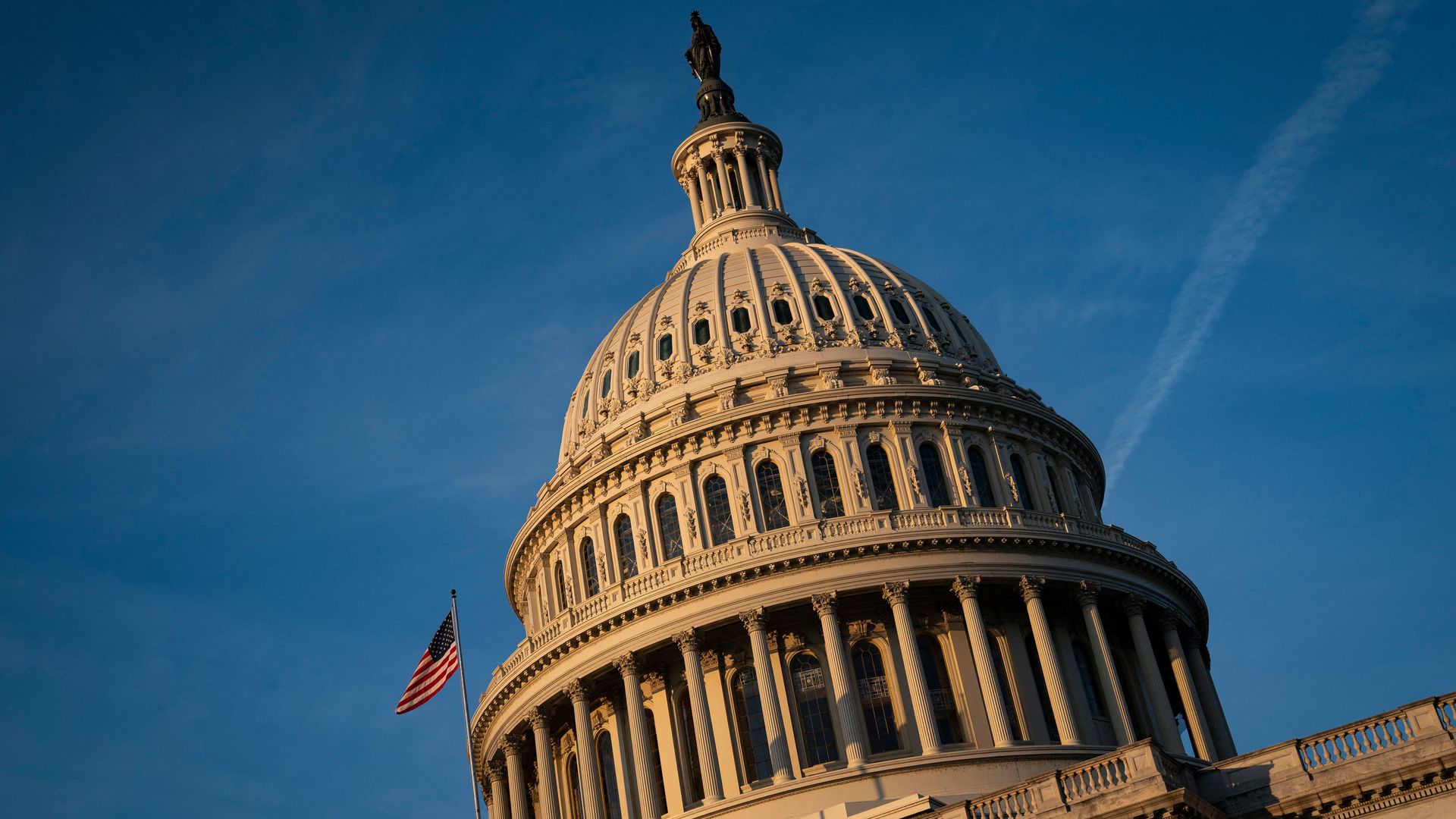 | | | Photo: Alex Edelman/AFP via Getty Images | | | | Senate Majority Leader Chuck Schumer's decision to take up the National Defense Authorization Act this week likely will push Senate consideration of President Biden's Build Back Better social spending plan into December, piling more anxiety onto progressives, Axios' Hans Nichols writes. Why it matters: Liberal Democrats already were worried that House moderates' commitment to vote on the BBB (estimated at $1.75 trillion) was less than ironclad after the passage of the $1.2 trillion infrastructure bill (which Biden is to sign tomorrow). - Now, with inflation angst growing, Biden's and Democrats' poll numbers sinking and midterms approaching, time probably isn't on the side of those championing more massive spending.
Driving the news: Schumer's scheduling announcement in a Sunday morning "Dear Colleague" letter comes after Speaker Nancy Pelosi promised a House vote this week on BBB. Some lawmakers anticipate that House vote to come on Friday, or perhaps over the weekend, before they leave for Thanksgiving break. - Five House centrists have agreed to vote on BBB pending an analysis from the Congressional Budget Office (CBO). That might get it over the line. But the CBO is expected to continue to drip out analysis on how much each of Biden's proposals will cost — and how much actual revenue can be expected from various proposed tax increases.
- Meanwhile, House centrists are nervously looking for any signs that Senate moderates including Joe Manchin (D-W.Va.) might move to punt the legislation into next year, especially after last week's report from the Bureau of Labor Statistics showing record levels of inflation.
- And the calendar is getting crowded: Congress also has to fund the government by Dec. 3 and raise the debt ceiling before the end of the year.
Be smart: While there's some progressive angst that the CBO's numbers won't match up with the president's, the real enemy has always been time — and the chance that the political environment could shift. Keep reading. |     | | | | | | 5. The VP's outside game | 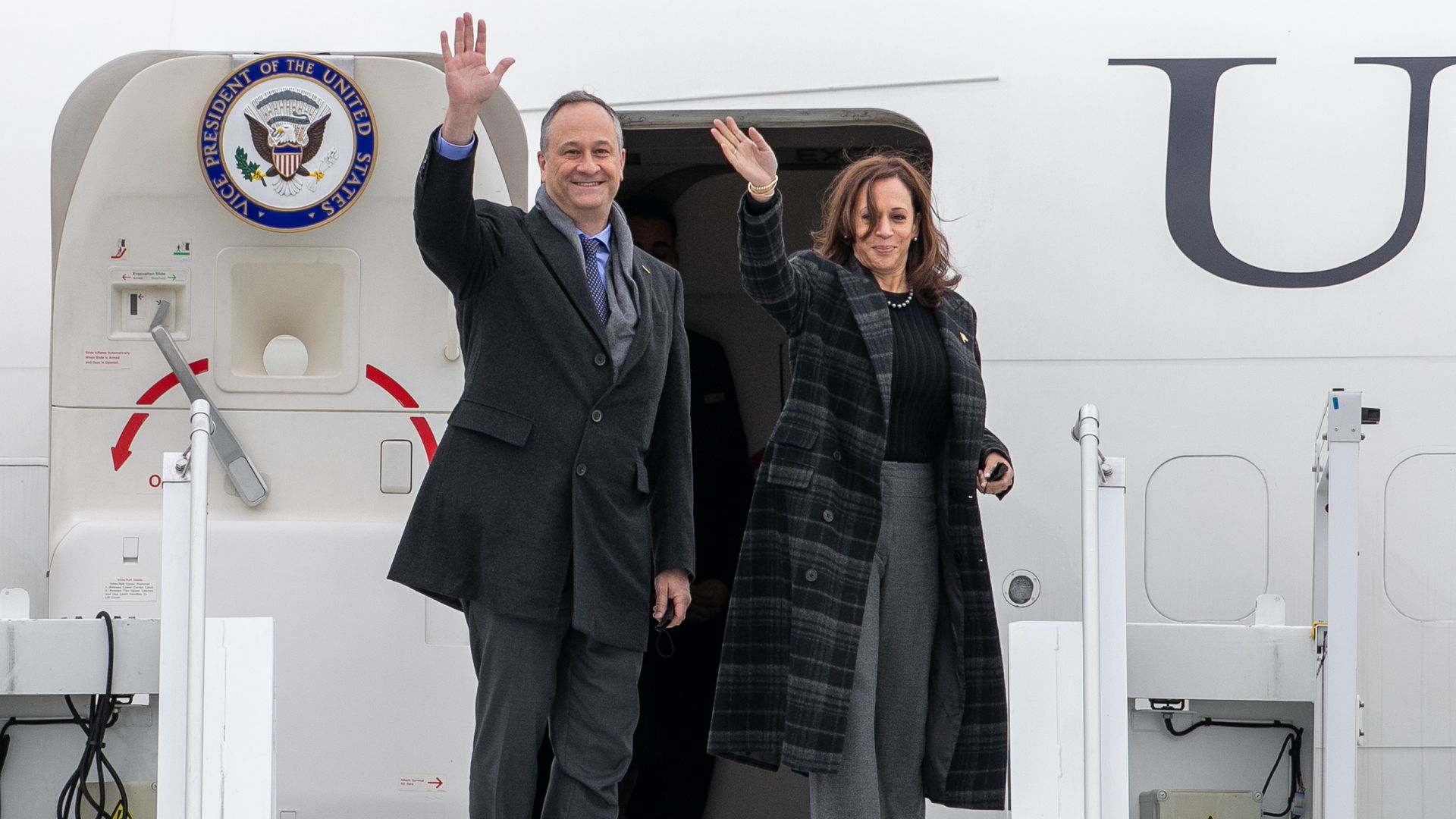 | | | Vice President Kamala Harris and her husband, Douglas Emhoff, leave France on Nov. 13 at Orly Airport in Paris. Photo: Marc Piasecki/Getty Images | | | | Monday's signing event for the $1.2 trillion bipartisan infrastructure bill should also be a victory lap for Vice President Kamala Harris, but so far voters haven't given her credit for largely under-the-radar efforts, Axios' Alexi McCammond writes. The big picture: Since the spring, Harris held more than 30 public events — and about 150 calls, meetings and other engagements with members of Congress — to tout elements of the infrastructure plan as well as President Biden's larger Build Back Better social spending plan. Details: Harris and her team focused on reaching voters through local media, "constituency-based media" including appearing in outlets like The Grio or joining Black radio personalities. She also made appearances on targeted programming such as the NBA All-Star Game, the Nickelodeon Kids' Choice Awards and a special on the Lifetime network. - She traveled to a water plant in Oakland, Calif.; a bus factory in North Carolina; an electric utility plant in New Hampshire to discuss broadband infrastructure; and a carpenters' training center in Las Vegas.
- Traveling in Paris after Congress passed the infrastructure bill, Harris highlighted the spending plans in separate speeches while there.
But, but, but: Harris' favorability (44% per a recent Los Angeles Times poll) is lower than her four predecessors' rating at the same time in their tenures. - Only 27% of independents view her favorably, and nearly 60% of white voters surveyed view her unfavorably.
- "The vice president herself has told several confidants she feels constrained in what she's able to do politically," CNN reports.
What we're watching: Her planned remarks at Biden's signing ceremony could mark a notable public appearance for a VP who's faced critiques for her visibility and comparisons to Transportation Secretary Pete Buttigieg who's been the more public face of the administration's infrastructure rollout. |     | | | | | | 6. Graphic du jour | 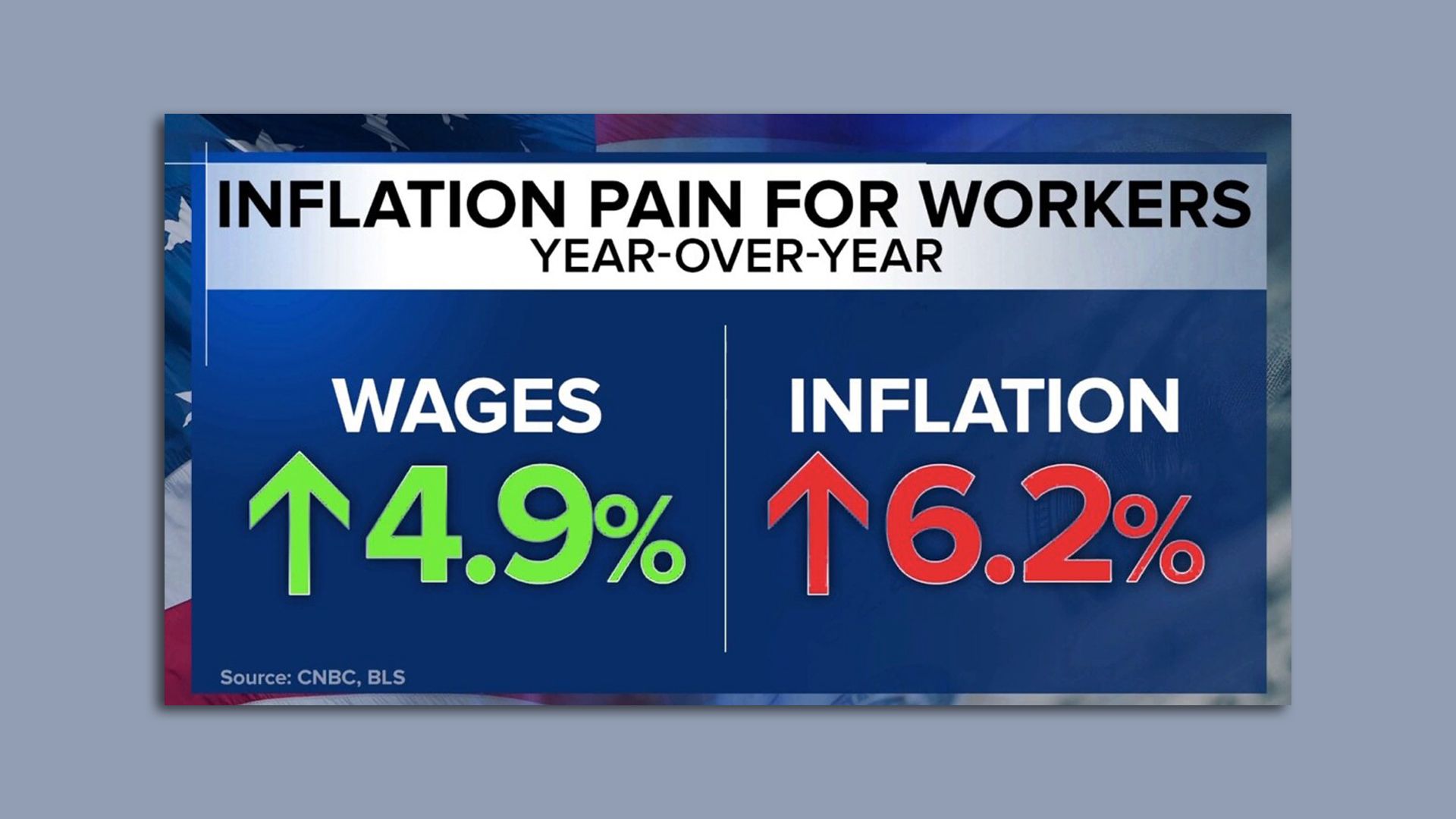 | | | Credit: NBC's "Meet the Press" | | | | A story in two numbers. |     | | | | | | A message from Amazon | | "Amazon has allowed me to live a comfortable life" | | | 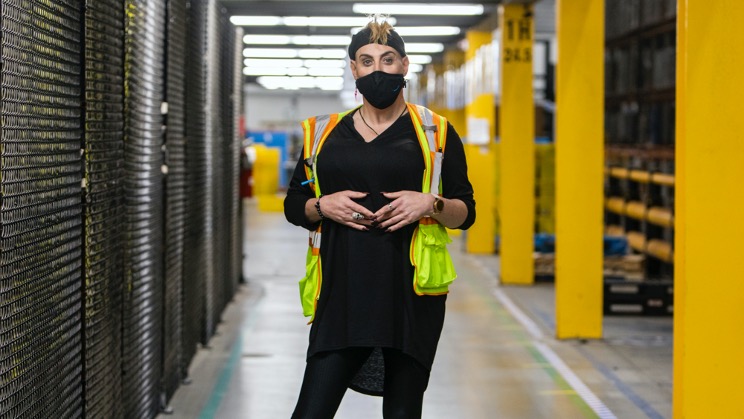 | | | | When Luv-Luv joined Amazon, she was just looking for a job — any job — with health care. What she found was so much more. Thanks to Amazon's starting wage of at least $15 an hour and comprehensive benefits, she is able to live life on her own terms. Watch her story. | | | | 🚀 Thanks for starting your week with us. Let your family, friends and colleagues know, they can subscribe to Sneak or any of Axios' other free local and national newsletters through this link. |  | | It'll help you deliver employee communications more effectively. | | | | | | Axios thanks our partners for supporting our newsletters. If you're interested in advertising, learn more here.
Sponsorship has no influence on editorial content. Axios, 3100 Clarendon Blvd, Suite 1300, Arlington VA 22201 | | | You received this email because you signed up for newsletters from Axios.
Change your preferences or unsubscribe here. | | | Was this email forwarded to you?
Sign up now to get Axios in your inbox. | | | | Follow Axios on social media:    | | | | | |





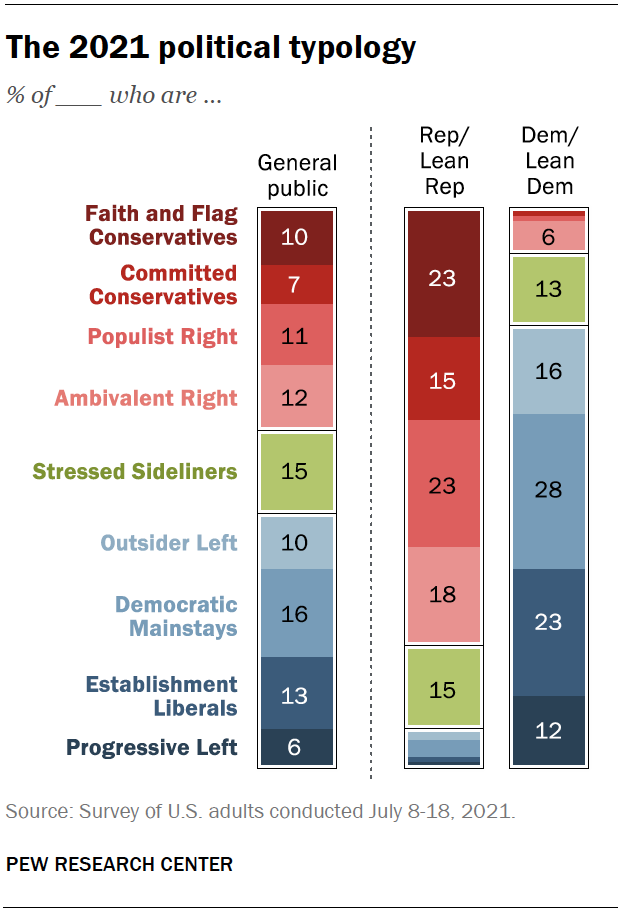




No comments:
Post a Comment